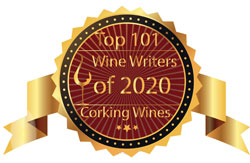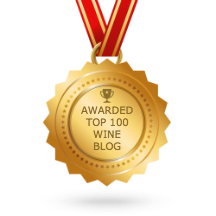wine reviews are a pair of excellent wines from one of my favourite South African wine producers - Ken Forrester Wines. Both of these terrific wines arrived at the LCBO recently, with the red wine making its debut at the LCBO in the LCBO VINTAGES New Release Collection, while the sparkling wine landed in the LCBO VINTAGES New Release Collection.
Ken Forrester Wines was established in 1993 by Ken Forrester and his wife, Teresa, after they acquired at a public auction a vacant and derelict farm and homestead that was situated on the slopes of the Helderberg Mountain, in the heart of Stellenbosch, South Africa's premier wine growing region. The site is one of the oldest farms in the Cape, with a long history that dates back to 1689, and the first vines were planted in 1694. The farm changed hands a number of times over the years, eventually falling on hard times in the early 1990s and finding itself up for auction.
The vision at Ken Forrester Wines is for sustainable farming - to improve the lot of their employees by growing their own business, and thereby providing maximum job opportunities in a market that is desperate for support. In the vineyard, Ken Forrester farms sustainably without the use of herbicides and pesticides. They also till the soil, prune, thin bunches and leaves, and harvest by hand. With this additional employment, they hope that it goes some way to improving the quality of life in their community, and they know that if every community looked after their own, no one would go wanting. This is their proposal, and consequently, each bottle is a victory and represents a small change – for the better – in someone's life. Additionally, Ken Forrester Wines are certified for Integrity & Sustainability by the South African Wine and Spirit Board.
At Ken Forrester Wines, the winemaking philosophy is based on managing their vineyards in a sustainable manner, along with a workplace environment and work ethic that should be a shining light in the industry. They have several ranges of wines that are handcrafted and individually made to complement a wide variety of cuisines and provide excellent value. The Pat's Garden is part of their Reserve Wine Range, where the team at Ken Forrester is solely responsible for the cultivation of the vines and selection of the fruit, most of which come from their family property in Stellenbosch, just 5 kilometres from the cool Atlantic and in the sheltered lee of the majestic Helderberg Mountain. The sparkling wine is part of Ken Forrester's Cellar Exclusives Range - a collection of special and limited parcels of wines.
An interesting note about the red wine is that while it used to be known as "Pat's Garden Merlot", it was always blended with 8–12% Cabernet Franc. The wine laws in South Africa allow for wines to be labelled as a single varietal wine so long as the blend does not exceed 15% of other varieties. The team at Ken Forrester began doing some experimentation by blending the 4 traditional Bordeaux varieties and with the 2018 vintage they launched the Pat's Garden Reserve wine.
The 2020 growing season in South Africa featured moderate to warm growing conditions, which continued into late autumn, while the 2022 vintage was one of the wettest and coldest in recent memory. There was a sudden heat spike just before harvest in 2022, but fall was generally cool and moderate. Both vintages were rated excellent, so let's see how this 2020 red and 2022 sparkling wine from South Africa is tasting tonight...
Aged on its lees for 20 months, the elegantly fragrant, medium-high intensity nose delivers lovely aromas of autolytic, toasty, leesy, biscuit, and honey characters surrounding a core of lemon citrus and golden apple. It has a finely beaded mousse and racy, gently tangy acidity on the medium+ bodied palate with delicious autolytic, biscuit, toasty, lemon citrus, and apple flavours, plus touches of honey in a fairly dry profile. Juicy on the mid-palate, while the long finish is savoury with leesy mineral notes. Highly recommended buy! Score: 91+ pts
KEN FORRESTER PAT'S GARDEN RESERVE 2020 - WO Western Cape, South Africa (#45169) (XD) - $19.95
Enclosed by screw cap, this blend of 44% Merlot, 28% Cabernet Franc, 23% Cabernet Sauvignon, and 5% Petit Verdot has a fragrant, medium-high intensity nose that is well-balanced with complex aromas of ripe red & black fruits, currant, raspberry, blackberry, cassis, oak spice, cocoa, savoury wet earth, and dried herbs with touches of leafy green herb notes. The medium-full bodied palate is dry and slightly chewy with more ripe red & black fruits, currant, cassis, raspberry, blackberry, oak spice, savoury wet earth, cocoa, and dried herb flavours. Acids are juicy and succulent, while the elegant tannins are smooth, refined, and gently grippy on the back palate. Impeccably balanced throughout with red & black fruits mingling with savoury wet earth, oak spice, and smoky minerals on the long finish. Has the stuffing to age gracefully for at least another 5 years. Highly recommended buy! Score: 91 pts
One other wine by Ken Forrester is widely available at the LCBO, while the full range can be ordered through their Agent - Noble Estates Wines & Spirits.
Ken Forrester Wines was established in 1993 by Ken Forrester and his wife, Teresa, after they acquired at a public auction a vacant and derelict farm and homestead that was situated on the slopes of the Helderberg Mountain, in the heart of Stellenbosch, South Africa's premier wine growing region. The site is one of the oldest farms in the Cape, with a long history that dates back to 1689, and the first vines were planted in 1694. The farm changed hands a number of times over the years, eventually falling on hard times in the early 1990s and finding itself up for auction.
The vision at Ken Forrester Wines is for sustainable farming - to improve the lot of their employees by growing their own business, and thereby providing maximum job opportunities in a market that is desperate for support. In the vineyard, Ken Forrester farms sustainably without the use of herbicides and pesticides. They also till the soil, prune, thin bunches and leaves, and harvest by hand. With this additional employment, they hope that it goes some way to improving the quality of life in their community, and they know that if every community looked after their own, no one would go wanting. This is their proposal, and consequently, each bottle is a victory and represents a small change – for the better – in someone's life. Additionally, Ken Forrester Wines are certified for Integrity & Sustainability by the South African Wine and Spirit Board.
At Ken Forrester Wines, the winemaking philosophy is based on managing their vineyards in a sustainable manner, along with a workplace environment and work ethic that should be a shining light in the industry. They have several ranges of wines that are handcrafted and individually made to complement a wide variety of cuisines and provide excellent value. The Pat's Garden is part of their Reserve Wine Range, where the team at Ken Forrester is solely responsible for the cultivation of the vines and selection of the fruit, most of which come from their family property in Stellenbosch, just 5 kilometres from the cool Atlantic and in the sheltered lee of the majestic Helderberg Mountain. The sparkling wine is part of Ken Forrester's Cellar Exclusives Range - a collection of special and limited parcels of wines.
An interesting note about the red wine is that while it used to be known as "Pat's Garden Merlot", it was always blended with 8–12% Cabernet Franc. The wine laws in South Africa allow for wines to be labelled as a single varietal wine so long as the blend does not exceed 15% of other varieties. The team at Ken Forrester began doing some experimentation by blending the 4 traditional Bordeaux varieties and with the 2018 vintage they launched the Pat's Garden Reserve wine.
The 2020 growing season in South Africa featured moderate to warm growing conditions, which continued into late autumn, while the 2022 vintage was one of the wettest and coldest in recent memory. There was a sudden heat spike just before harvest in 2022, but fall was generally cool and moderate. Both vintages were rated excellent, so let's see how this 2020 red and 2022 sparkling wine from South Africa is tasting tonight...
Tasting Notes:
KEN FORRESTER SPARKLEHORSE CAP CLASSIQUE BRUT SPARKLING CHENIN BLANC 2022 - Traditional Method, WO Stellenbosch, South Africa (#32030) (D) - $29.95Aged on its lees for 20 months, the elegantly fragrant, medium-high intensity nose delivers lovely aromas of autolytic, toasty, leesy, biscuit, and honey characters surrounding a core of lemon citrus and golden apple. It has a finely beaded mousse and racy, gently tangy acidity on the medium+ bodied palate with delicious autolytic, biscuit, toasty, lemon citrus, and apple flavours, plus touches of honey in a fairly dry profile. Juicy on the mid-palate, while the long finish is savoury with leesy mineral notes. Highly recommended buy! Score: 91+ pts
KEN FORRESTER PAT'S GARDEN RESERVE 2020 - WO Western Cape, South Africa (#45169) (XD) - $19.95
Enclosed by screw cap, this blend of 44% Merlot, 28% Cabernet Franc, 23% Cabernet Sauvignon, and 5% Petit Verdot has a fragrant, medium-high intensity nose that is well-balanced with complex aromas of ripe red & black fruits, currant, raspberry, blackberry, cassis, oak spice, cocoa, savoury wet earth, and dried herbs with touches of leafy green herb notes. The medium-full bodied palate is dry and slightly chewy with more ripe red & black fruits, currant, cassis, raspberry, blackberry, oak spice, savoury wet earth, cocoa, and dried herb flavours. Acids are juicy and succulent, while the elegant tannins are smooth, refined, and gently grippy on the back palate. Impeccably balanced throughout with red & black fruits mingling with savoury wet earth, oak spice, and smoky minerals on the long finish. Has the stuffing to age gracefully for at least another 5 years. Highly recommended buy! Score: 91 pts
One other wine by Ken Forrester is widely available at the LCBO, while the full range can be ordered through their Agent - Noble Estates Wines & Spirits.



























